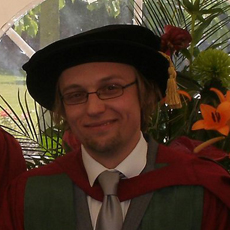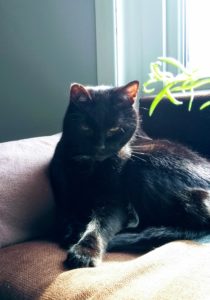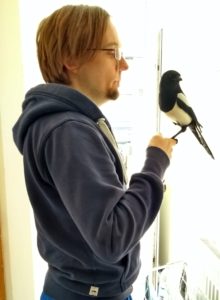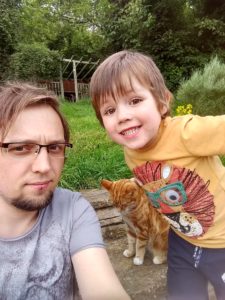 1. What is your role within the History department? I’m a Lecturer in Modern History, and I convene the MA in History, one of our larger distance learning programmes.
1. What is your role within the History department? I’m a Lecturer in Modern History, and I convene the MA in History, one of our larger distance learning programmes.
2. What are your research interests? I started out as a military historian, but more recently I’ve been researching the history of drugs and drug use. In particular, I’ve focused on the place of amphetamines in the 1930s and 1940s. I want to find out more about what motivates people to use drugs, how drugs are conceptualised and understood, and how these issues are affected by the social and cultural contexts in which people exist. Themes like mass communication culture, consumer culture and how the ‘self’ is conceived are all things that interest me. I teach a third year course about this called ‘Holiday from reality’ and I also run a Group Research option exploring similar drug history themes.
3.Where did you study (UG, PGT, PGR etc.)? I completed a BA in Military and International History at Salford, an MA in International History at Aberystwyth, and a PhD in Modern History at the University of Birmingham. I’ve also got a PGCHE from Birmingham.
4. Did you always know you wanted to go to university or in to academia? I always enjoyed studying history, even in primary school. I remember learning about the history of local churches or castles, and I always enjoyed exploring the history of war and battles. It was at secondary school that I knew I wanted to go to university, and I recall asking the careers office about options to study military history. I was so excited when I was accepted to study at the University of Salford in 2001. I knew I wanted to stay in academia after about two weeks of my undergraduate course. It just felt like home. I was the first of my immediate family to go to University.
5. How long did it take and how did you manage to fund and complete your PhD? I actually started a PhD at the University of Exeter in 2005. I had a full Arts and Humanities Research Council Scholarship. I only lasted 12 months. I wasn’t ready for the demands of a PhD at 22. I then went to work as a civil servant for a few years. It was a really important step. I gained so much administrative, organisational and customer service experience, and it really made me value my university experience even more.
I returned to PhD studies at the University of Birmingham in 2009. I had funding from the Royal Aeronautical Society, the Royal Air Force Museum, and some money from the College of Arts and Law. This didn’t cover everything. I worked in local government full-time during the first year of my PhD and part-time during the second year. I then focused purely on my doctorate in my final year, and it was during this time that I started teaching. I submitted in November 2012 and graduated in the summer of 2013.
6. What was your PhD on? My PhD explored how the British Army and Royal Navy conceptualised aviation and air power before and during the First World War. This included how they made use of aircraft during the conflict to establish what has become known as ‘control of the air’. It’s this concept and the history of British military aviation during the Great War that was the subject of my first book. It’s very different to my latest research on the social and cultural history of drugs, but I continue to believe that the study of wars and militaries is really important.
7. What are you working on at the moment? I’ve just finished an article exploring the relationship between amphetamine use, consumer culture and the self in 1930s Britain (and Europe). It’s been a very long and interesting journey. I’m going to revisit these themes with my next piece of research, but this time exploring the history of amphetamine via the lens of race and empire. It’s a subject that I’ve not really studied before so I’m excited to challenge myself with some new reading.
8. What made you want to become a lecturer/academic? I just loved being at University. I love reading; having the space to discuss ideas; and I especially love researching and writing about the past. Being an academic means I get to do all these things. Sharing my research with students, and helping historians grow and develop their skills is another hugely rewarding part of what I do.
9. Name three books/films/podcasts you recommend to read/watch/listen to during lockdown.
- I wanted to know a little bit more about the history of pandemics, so I’ve been reading the work of Mark Honigsbaum. His essay on ‘Russian influenza’ was really interesting, with striking parallels to the present.
- As for podcasts, my partner has recently started producing ambient soundscapes. I’m finding ambience to be really useful to help me concentrate or to dissipate stress and anxieties. Here’s a link to a nice soothing (and pretty) soundscape. You could also try Wavepaths, a really cool website that uses ambient sound for therapeutic purposes.
- I’ve also been trying to re-watch classic films. I re-watched 12 Angry Men recently. Might be my favourite film of all time.
10. What is the most historically inaccurate film or scene you have watched or read? Oh, this used to bother me lots and lots. Tom Hardy would have run out of ammunition in his Spitfire way before the end of Dunkirk! But then I realised I was becoming an insufferable person to watch films with. Now I try to enjoy films as entertainment, and I’m much more connected to the individual acting performances, and the social, cultural and political themes to which films are trying to speak.
11. Are you staying physically active during lockdown? If so, how, and do you suggest anything? I try to go for a walk every day, I use my cross trainer most days, and I do stretching and strength and conditioning exercises on those days too. Exercise is really important for my well-being. It helps me sleep, it means I can enjoy my meal times even more, and I find it to be a really useful space in which to switch off my mind. Just some simple stretching is what I would recommend. YouTube has lots of good examples you could try.
 12. Do you have any pets? If so, what? (Pictures encouraged!) My partner has a cat. He is called Rusko. Rusko is my nemesis. He resents my existence. Secretly I think he is wonderful, but I’m not going to tell him. We spend our days aggravating each other. Cats are awesome!
12. Do you have any pets? If so, what? (Pictures encouraged!) My partner has a cat. He is called Rusko. Rusko is my nemesis. He resents my existence. Secretly I think he is wonderful, but I’m not going to tell him. We spend our days aggravating each other. Cats are awesome!
13. What is your favourite film or TV series? I love the work of Hayao Miyazaki (Castle of Cagliostro; Nausicaä; Castle in the Sky), and I’m a big fan of the Ealing comedies of the 1940s and 1950s (e.g. The Titfield Thunderbolt). I also like animated shows. Bravest Warriors is delightfully strange.
14. Do you have a favourite band/album/genre of music? If so, what? I listen to all sorts, but find I gravitate towards three kinds of music at the moment: progressive metal; dubstep, drum and bass, and bass music more generally; and psychedelic electronic music.
My favourite band are Tool. Their music changed my life.
Recently I’ve been listening to a lot of music written by my friend Saxon. He lives in Wales and makes fantastic electronic music. Like a lot of independent artists he’s having a challenging time with gigs and festivals being cancelled, and I’ve been doing my best to support my favourite musicians where I can.
 15. Do you have any unusual links or claims to fame? Not a claim to fame, but it is unusual: A random wild Magpie came to stay with me for a little while. They used to visit regularly. It was one of the strangest and most amazing things I’ve experienced.
15. Do you have any unusual links or claims to fame? Not a claim to fame, but it is unusual: A random wild Magpie came to stay with me for a little while. They used to visit regularly. It was one of the strangest and most amazing things I’ve experienced.
16. What skill would you one day like to master? I’ve played the bass and guitar for nearly twenty years. I’m still useless at both. It’s probably about time I started practising a little more. More immediately, I’ve decided that I need to learn how to do a cartwheel.
 17. What takes up too much of your time? Time is a difficult one as an academic. I regularly find myself ‘busy’ with admin and emails, and I don’t always have enough time for either my own research or my own interests outside of work. I’m working hard on this. I try to make sure I have better boundaries in place so I don’t feel like I’m working all the time. I really enjoy reading, listening to and playing music, going to festivals, watching films, and spending time with my partner and my friends.
17. What takes up too much of your time? Time is a difficult one as an academic. I regularly find myself ‘busy’ with admin and emails, and I don’t always have enough time for either my own research or my own interests outside of work. I’m working hard on this. I try to make sure I have better boundaries in place so I don’t feel like I’m working all the time. I really enjoy reading, listening to and playing music, going to festivals, watching films, and spending time with my partner and my friends.
18. What songs have you completely memorized? I know quite a few Tool songs by heart. I would recommend Reflection and Lateralus. I have some of the lyrics to Reflection tattooed on my arm, and I have lyrics to both songs on the door of my office in the Arts building.
19. What advice would you give to your younger self? I’ve had a stutter for most of my life. It really damaged my confidence when I was younger. It’s still with me now, but I simply try to be more confident and comfortable with who I am. I’m cool because of my imperfections – and so are you 🙂
20. Do you have any top tips for academic work/study for our students?
I’ve got a couple of things you could consider:
- One of the things that helped unlock history for me was the idea that we’re all having conversations with each other about the past. That’s what academic historians do, and that’s where the study of historiography is so important. When you’re thinking about the past and you’re writing your essays, try to think about how your ideas and interpretations relate to those of other historians. Ask yourself, how are my ideas or arguments nuancing, supporting or developing the ideas of others? Recognise your part of this conversation. It’s important, because we’re all actively contributing to studying and understanding the past.
- And second, have a little think about what historical subjects interest you. Historians very often study something in the past because they want to understand something about their present. Does that apply to the historical things that interest you?
